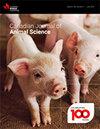模拟加拿大饲养场取消提高生产力技术对环境的影响:一个案例研究
IF 1
4区 农林科学
Q3 AGRICULTURE, DAIRY & ANIMAL SCIENCE
引用次数: 0
摘要
摘要对采用或不采用提高生产力技术处理的饲养场牛(n=40 hd处理−1试验−1)的温室气体(GHG)和氨(NH3)排放、土地和用水进行了多年研究建模(n=4)。小母牛(H)被分配到以下治疗:(1)植入(HTBA);(2) 提供有醋酸麦勒司琼(HMGA);(3) 非植入对照,重量调节(CON_Adj)以实现与1(HCON_AdjTBA)相同的最终胎体重量(CW);或者(4)CON_Adj以实现CW为2(HCON_AdjMGA)。牛(S)被分配如下:(1)植入(STBA);(2) 植入并提供盐酸莱克多巴胺(SRAC;在过去2年中进行);(3) CON_Adj以实现与1相同的CW(SCON_AdjTBA);或者(4)CON_Adj以实现与2相同的CW(SCON_AdjRAC)。HTBA、HMGA、STBA和SRAC的GHG和NH3排放量分别比相应的对照牛低3.8%、3.0%、10.1%和8.5%,以及4.3%、2.9%、7.4%和7.6%。HTBA、HMGA、STBA和SRAC生产饲料所需的土地也分别减少了6.6%、4.8%、9.9%和10.9%,而用水量分别减少了6.4%、4.8%、10.1%和11.1%。这项建模研究清楚地表明,传统牛肉生产系统比非传统系统的环境足迹更低。本文章由计算机程序翻译,如有差异,请以英文原文为准。
Modelling environmental impacts associated with the removal of productivity-enhancing technologies from Canadian feedlots: a case study
Abstract Greenhouse gas (GHG) and ammonia (NH3) emissions, land and water use associated with feedlot cattle (n = 40 hd treatment−1 trial−1) treated with or without productivity-enhancing technologies were modelled for a multiyear study (n = 4). Heifers (H) were assigned to the following treatments: (1) implanted (HTBA); (2) provided with melengestrol acetate (HMGA); (3) nonimplanted control, weight-adjusted (CON_Adj) to achieve the same final carcass weight (CW) as 1 (HCON_AdjTBA); or (4) CON_Adj to achieve the CW as 2 (HCON_AdjMGA). Steers (S) were assigned as follows: (1) implanted (STBA); (2) implanted and provided with ractopamine hydrochloride (SRAC; conducted in the last 2 years); (3) CON_Adj to achieve the same CW as 1 (SCON_AdjTBA); or (4) CON_Adj to achieve the same CW as 2 (SCON_AdjRAC). The GHG and NH3 emissions from HTBA, HMGA, STBA, and SRAC were 3.8%, 3.0%, 10.1%, and 8.5% lower and 4.3%, 2.9%, 7.4%, and 7.6% lower, respectively, than the respective control cattle. The land required to produce feed was also reduced by 6.6%, 4.8%, 9.9%, and 10.9%, while water use was reduced by 6.4%, 4.8%, 10.1%, and 11.1% for HTBA, HMGA, STBA, and SRAC, respectively. This modelling study clearly demonstrates that conventional beef production systems have a lower environmental footprint than nonconventional systems.
求助全文
通过发布文献求助,成功后即可免费获取论文全文。
去求助
来源期刊

Canadian Journal of Animal Science
农林科学-奶制品与动物科学
CiteScore
2.30
自引率
0.00%
发文量
51
审稿时长
6 months
期刊介绍:
Published since 1957, this quarterly journal contains new research on all aspects of animal agriculture and animal products, including breeding and genetics; cellular and molecular biology; growth and development; meat science; modelling animal systems; physiology and endocrinology; ruminant nutrition; non-ruminant nutrition; and welfare, behaviour, and management. It also publishes reviews, letters to the editor, abstracts of technical papers presented at the annual meeting of the Canadian Society of Animal Science, and occasionally conference proceedings.
 求助内容:
求助内容: 应助结果提醒方式:
应助结果提醒方式:


